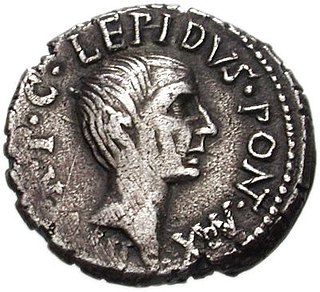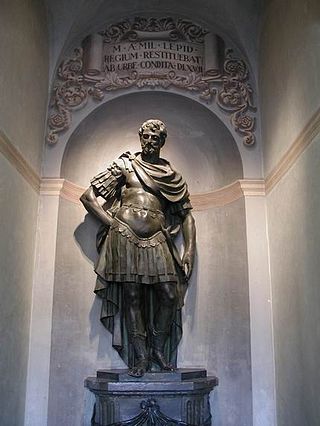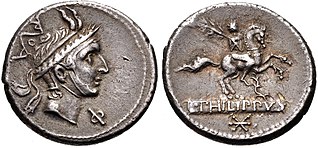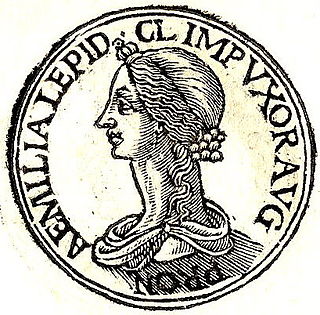
Marcus Antonius, commonly known in English as Mark Antony, was a Roman politician and general who played a critical role in the transformation of the Roman Republic from a constitutional republic into the autocratic Roman Empire.
Year 43 BC was either a common year starting on Sunday, Monday or Tuesday or a leap year starting on Sunday or Monday of the Julian calendar and a common year starting on Monday of the Proleptic Julian calendar. At the time, it was known as the Year of the Consulship of Pansa and Hirtius. The denomination 43 BC for this year has been used since the early medieval period, when the Anno Domini calendar era became the prevalent method in Europe for naming years.

This article concerns the period 49 BC – 40 BC.

Marcus Aemilius Lepidus was a Roman general and statesman who formed the Second Triumvirate alongside Octavian and Mark Antony during the final years of the Roman Republic. Lepidus had previously been a close ally of Julius Caesar. He was also the last pontifex maximus before the Roman Empire, and (presumably) the last interrex and magister equitum to hold military command.

The gens Aemilia, originally written Aimilia, was one of the greatest patrician families at ancient Rome. The gens was of great antiquity, and claimed descent from Numa Pompilius, the second King of Rome. Its members held the highest offices of the state, from the early decades of the Republic to imperial times. The Aemilii were almost certainly one of the gentes maiores, the most important of the patrician families. Their name was associated with three major roads, an administrative region of Italy, and the Basilica Aemilia at Rome.

Marcus Aemilius Lepidus was a Roman consul, Pontifex Maximus, Censor and Princeps Senatus. A scion of the ancient Patrician gens Aemilia, he was most likely the son of Marcus Aemilius Lepidus, with his brothers being Lucius and Quintus.
Decimus Junius Silanus Torquatus was a Roman senator who lived during the 1st century.
Aemilia Lepida is a Latin feminine given name that was given to the daughters of various Aemilius Lepiduses, men belonging to the Lepidus branch of the Aemilia gens (family) that was founded by the Marcus Aemilius Lepidus who served as consul in 285 BC. The Aemila Lepidas who appear in Roman historians were principally known for their engagements and marriages, with those in the late Republic and early Empire related to the Julio-Claudian dynasty.

Lucius Munatius Plancus was a Roman senator, consul in 42 BC, and censor in 22 BC with Paullus Aemilius Lepidus. He is one of the classic historical examples of men who have managed to survive very dangerous circumstances by constantly shifting their allegiances. Beginning his career under Julius Caesar, he allied with his assassin Decimus Junius Brutus in 44 BC, then with the Second Triumvirate in 43 BC, joining Mark Antony in 40 BC, and deserting him for Octavian in 32 BC. He also founded the cities of Augusta Raurica and Lugdunum. His tomb is still visible at Gaeta.

The gens Junia or Iunia was one of the most celebrated families of ancient Rome. The gens may originally have been patrician, and was already prominent in the last days of the Roman monarchy. Lucius Junius Brutus was the nephew of Lucius Tarquinius Superbus, the seventh and last King of Rome, and on the expulsion of Tarquin in 509 BC, he became one of the first consuls of the Roman Republic.
Marcus Aemilius Lepidus was a Roman statesman and general. After the death of Lucius Cornelius Sulla, he joined or instigated a rebellion against the Sullan regime, demanding a consecutive term as consul late in his year and, when refused, marching on Rome. Lepidus' forces were defeated in a battle near the Milvian Bridge and he fled to Sardinia. He was the father of the triumvir Lepidus and of the Lucius Aemilius Lepidus Paullus who was consul in 50 BC.

Lucius Marcius Philippus was a Roman orator and an important politician of the late Roman Republic.

Aemilia Lepida was a noble Roman woman and matron. She was the first great-grandchild of the Emperor Augustus.
Marcus Aemilius Lepidus (6–39) was a Roman Patrician and the husband of the emperor Caligula's younger sister Julia Drusilla.

The gens Porcia, rarely written Portia, was a plebeian family at Ancient Rome. Its members first appear in history during the third century BC. The first of the gens to achieve the consulship was Marcus Porcius Cato in 195 BC, and from then until imperial times, the Porcii regularly occupied the highest offices of the Roman state.

The Philippics are a series of 14 speeches composed by Cicero in 44 and 43 BC, condemning Mark Antony. Cicero likened these speeches to those of Demosthenes against Philip II of Macedon; both Demosthenes' and Cicero's speeches became known as Philippics. Cicero's Second Philippic is styled after Demosthenes' On the Crown.

The gens Postumia was a noble patrician family at ancient Rome. Throughout the history of the Republic, the Postumii frequently occupied the chief magistracies of the Roman state, beginning with Publius Postumius Tubertus, consul in 505 BC, the fifth year of the Republic. Although like much of the old Roman aristocracy, the Postumii faded for a time into obscurity under the Empire, individuals bearing the name of Postumius again filled a number of important offices from the second century AD to the end of the Western Empire.

The gens Antonia was a Roman family of great antiquity, with both patrician and plebeian branches. The first of the gens to achieve prominence was Titus Antonius Merenda, one of the second group of Decemviri called, in 450 BC, to help draft what became the Law of the Twelve Tables. The most prominent member of the gens was Marcus Antonius.
Decimus Junius Brutus was a Roman politician who was elected consul in 77 BC.













